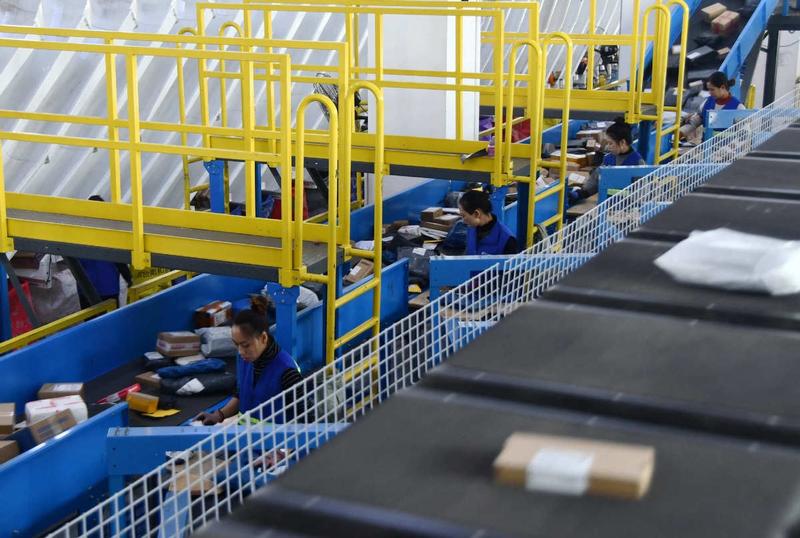 Workers sort boxes at a package transfer center in Handan of North China's Hebei province on Nov 11, 2020. (PHOTO / XINHUA)
Workers sort boxes at a package transfer center in Handan of North China's Hebei province on Nov 11, 2020. (PHOTO / XINHUA)
Retailers in China are increasingly embracing green practices as Chinese consumers care for environmental protection and sustainable development, experts said.
Huang Qianyi, 29, an office worker in Beijing, considers herself an inveterate spender who can perhaps stop shopping only by chopping off her own hands, in a manner of speaking. This year, she decided to become a discerning consumer by embracing environmental consciousness and steering clear of profligacy.
International retail brands, which own businesses in China, have made commitments one after another to accelerate green innovation, in terms of raw material technology, supply chain supervision and business mode
Wang Jing, director of USGBC North Asia
That decision can be traced to the fact that Huang's overflowing wardrobe is stuffed with all kinds of dresses, some of which she has not even worn yet.
Her dilemma today is whether she should give them all away or simply stop buying new clothes.
ALSO READ: More effort put in place for greener package wrapping
A garment-recycling initiative launched by Sweden-based clothing and cosmetic retailer H&M came to Huang's rescue.
The H&M initiative encourages consumers in China to recycle clothing. It offers 15 percent discount coupons to consumers who trade in their used clothes to its stores.
"I may have been a habitual shopper, but I am also all for environmental protection. I sometimes feel guilty when buying too many clothes. My worries are now finally resolved," Huang said.
According to a recent report by the United States Green Building Council, "green" and "sustainable "have become buzzwords among retailers in China.
"Sustainability is no longer a 'better-to-have' option. International retail brands, which own businesses in China, have made commitments one after another to accelerate green innovation, in terms of raw material technology, supply chain supervision and business mode," said Wang Jing, director of USGBC North Asia.
READ MORE: Green awareness rising among companies in China, says report
The trend was in evidence during the online shopping festival called Singles Day on Nov 11. Alibaba Group's online marketplace Taobao offered virtual "environmentally friendly advocate" certificates to e-shoppers who agreed to cut down on the use of plastic bags and other packaging materials received from couriers or deliverymen.
Retail brands have a vast potential to drive greener changes across the value chain-from influencing suppliers to advocating consumers. Those retail brands pursuing LEED certifications normally position green retail spaces and/or green supply chains as part of their sustainability strategies.
Wang Jing, Director of United States Green Building Council North Asia
Swiss food giant Nestle and Aupres of Japanese cosmetics company Shiseido replaced their cardboard boxes usually heavily Scotch-taped with zip boxes, in order to cut down on the use of the plastic adhesive tape.
US-based McKinsey Global Institute said in a recent report that the global business environment is veering toward environmentally friendly building technologies as demand for greener lifestyles increases.
Wang from USGBC said that in recent years, the organization has witnessed growing Leadership in Energy and Environmental Design or LEED participation, a globally recognized green building certification system, in China's retail sector.
According to USGBC data, by the end of July, it had received 5,833 LEED applications in the Chinese market, and 987, or 17 percent, were from the retail sector. Prominent brands among the applicants included 7-Eleven, McDonald's, Starbucks, Nike, Swarovski, Zara, Burberry, Gucci and Prada.
"In the post-pandemic era, retailers with LEED certification offer consumers with a safer and healthier user experience," Wang said.
In an interview with Beijing-based fashion media outlet WWD, Torquil Mclntosh, co-founder of British architecture office Sybarite, said that in the wake of COVID-19, retail stores should leave enough safe space for consumers. In this way, every inch of their skin would be safe and comfortable.
With the new concept, retail stores can give full play to their imagination to create fresh shopping experiences, he told WWD.
"Retail brands have a vast potential to drive greener changes across the value chain-from influencing suppliers to advocating consumers. Those retail brands pursuing LEED certifications normally position green retail spaces and/or green supply chains as part of their sustainability strategies," Wang said.
ALSO READ: Govt calls on delivery companies to go green
According to the USGBC report, from now to 2030, green-minded younger consumers, who feel they have a responsibility for the planet's future, are expected to emerge as the backbone of China's consumer market as well as labor market.
So, green and sustainable practices should inform retail brands' business strategies in China, industry experts said.


